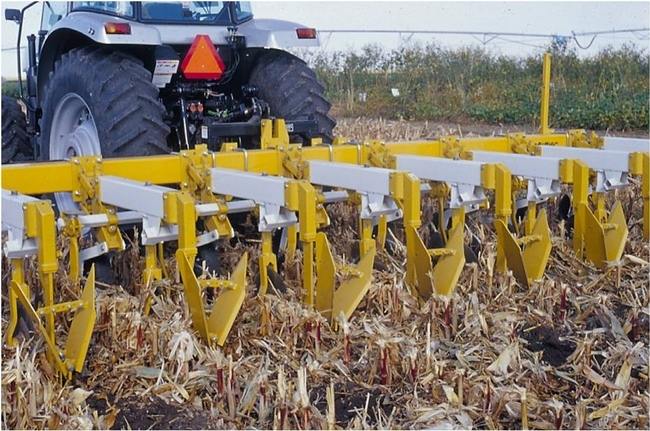Posts Tagged: Kent Brittan
More farmers trying conservation agriculture
"Let it be" is the mantra of some Central Valley farmers when it comes to turning up the soil, wrote John Holland in the Modesto Bee. Holland was reporting on a recent UC survey that found more farmers are using conservation agriculture practices.
The survey was conducted by UC's Conservation Agriculture Systems Institute, made up of government, academic and environmental partners. It looked at land in nine San Joaquin Valley counties that was planted in silage and grain corn, small grains for hay, tomatoes, cotton, dry beans and melons.
In 2010, conservation tillage systems accounted for about 14 percent of the acreage, an increase from about 10 percent in 2008. Minimum tillage practices were used on about 33 percent of crop acreage in 2010, up from about 21 percent in 2008.
In California, a different problem exists
Stockton Record
In California, 75 to 80 percent of corn is a genetically engineered variety, and much of it carries Bt genes, said Kent L. Brittan, the University of California Cooperative Extension's director for Yolo County and field crops advisor.
The corn seed is purchased for glyphosate tolerance. Seed companies commonly combine the traits in their products, so the Bt genes are part of the package, even though corn rootworm is not a concern for California growers.
"We have the insect; it has never - knock on wood - been a corn pest here in California, so the resistance problem would not be an issue with us," Brittan said.
Late October rain a mixed bag for California ag
Rain and cool temperatures this week have prompted newspapers to see how the weather change is sitting with the state's agricultural industry.
The Woodland Daily Democrat reported that local rain and wind were good for some crops, and bad for others. The cool weather has postponed the harvest date for rice, while the rain has provided enough water for wheat to germinate, the story said.
UC Cooperative Extension farm advisor Kent Britton told reporter Katherine Jarvis farmers should wait until Nov. 1 to plant their winter wheat to avoid frost damage later in the season.
The Stockton Record reported that late winegrape varieties, tomatoes, almonds, walnuts, cut hay, beans, silage and grain corn, and rice are all taking a hit from the weekend rain. Meanwhile, the rain is a boon to cattle and sheep ranchers whose pastures are being watered.
UCCE viticulture advisor Paul Verdegaal told reporter Reed Fujii most of the Lodi area's 100,000 acres of vineyards have already been harvested.
"It's probably overall a little less damaging for the Lodi district than compared to the coastal and foothill areas, (where the harvests) are a little bit delayed," Verdegaal was quoted.
Fujii also spoke to UCCE vegetable crops advisor Brenna Aegerter. She said there could be rain-related problems with cannery and fresh market tomatoes.
"Usually there's a delay, so maybe they can't go into the field for several days," Aegerter was quoted. "Then when they get back in, you get fruit rot, when the fruit has been wet for a couple days."
Roundup Ready canola becomes a problem weed in California
Two UC Cooperative Extension farm advisors have found that Roundup Ready canola can be overly persistent in California, according to an article in Western Farm Press.Doug Munier of UCCE in Glenn County and Kent Brittan of UCCE in Yolo County studied the herbicide-resistant oil crop to determine its potential for biofuel. However, they found that yields were too low to make canola a profitable irrigated California crop.
"They gave up on canola, but canola did not give up on California," wrote Farm Press editor Harry Cline. "It is still around in many fields, three or four years after it was grown as a commercial crop."
The problem is canola's tendency to shatter. Seed matures from the base of the stem sequentially up to the top of the main stem. By the time the seed at the upper part of the plant is mature, the pods at the bottom of the plant will likely have fallen to the ground, or "shattered."
Munier told the reporter that a significant percentage of canola's "shattered seed" does not germinate the following year. When the shattered seed is incorporated into dry soil, it creates secondary seed dormancy.
As an example, Munier related the experience of a Sacramento Valley farmer growing Roundup Ready alfalfa.
“The grower sprayed his Roundup Ready alfalfa and got beautiful weed control except for what he thought was mustard. The herbicide did not touch it," Munier was quoted in the story. "His PCA looked closer and discovered it was Roundup Ready canola. Recognizing the problem, he rogued out the canola."
For a trial in the Chico area, Munier planted Roundup Ready canola in the fall of 2006. Harvested the next summer, the field was summer fallowed in 2007 followed by fall-planted wheat. Roundup Ready canola volunteers from the 2007 harvest are still sprouting in 2010.
“This is not just a weed, but one totally resistant to Roundup, a herbicide that is intensely used in a wide variety of high value crops in California,” Munier told the reporter.

Canola reseach plot.

